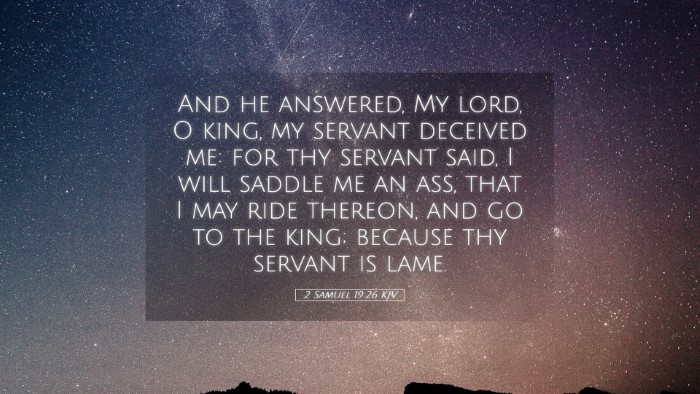Commentary on 2 Samuel 19:26
Verse Text: "And he answered, 'My lord, O king, my servant deceived me: for thy servant said, I will saddle me an ass, that I may ride thereon, and go to the king; and he hath slandered thy servant unto my lord the king: but my lord the king is as an angel of God: do therefore what is good in thine eyes.'" (2 Samuel 19:26, KJV)
Contextual Overview
This verse occurs in the larger context of the aftermath of Absalom’s rebellion. David has returned to Jerusalem, and there is a significant political and emotional restoration occurring among his people. Mephibosheth, the grandson of Saul, is confronted by King David regarding his loyalty during Absalom’s insurrection. This encounter reflects deep themes of loyalty, betrayal, and grace.
The Characters Involved
- King David: The anointed king of Israel, now restoring his throne after a tumultuous period.
- Mephibosheth: The son of Jonathan and the grandson of Saul, who had been disabled since childhood.
- Ziba: The servant of Mephibosheth who is accused of deceit and treachery in this passage.
Verse Analysis
This verse is significant as it embodies a complex interaction laden with themes of loyalty, deception, and power dynamics. The accusations brought against Mephibosheth by Ziba frame much of his response to David.
Mephibosheth's Justification
“My servant deceived me” indicates that Mephibosheth is attempting to clear his name, attributing his perceived betrayal to Ziba's actions. This highlights a key aspect of human relationships, where the actions of one can unjustly reflect or tarnish the character of another.
Matthew Henry elaborates on this, stating that Mephibosheth’s defense illustrates the painful reality of being caught between loyalty to one’s sovereign (David) and the treachery of those who surround him.
The Role of Ziba
Ziba’s role in this narrative cannot be overlooked. His actions serve as a catalyst for the tension between David and Mephibosheth. Albert Barnes reflects on Ziba’s motivations, suggesting that his deceit may have stemmed from a desire for personal gain amid political chaos. Thus, Ziba’s treachery not only threatens Mephibosheth but complicates the landscape of royal loyalty.
Theological Implications
This encounter sheds light on the difficulty of discerning truth in human relationships. Often, the narrative we believe about ourselves and others is tainted by the perceptions and intentions of those around us. In a world rife with deception, this passage invites readers to seek deeper truths, particularly in their walk with God.
Grace Amidst Deception
David’s response to Mephibosheth is crucial. Despite the chaotic backdrop, David carries the mantle of grace; he is depicted as an “angel of God”. Adam Clarke notes that this reflects David’s role not merely as a political leader but as a figure through whom divine justice and mercy can be realized. The king has the authority to act—for better or worse—but is reminded of his capacity for grace.
Lessons for Leaders
For pastors and leaders, David’s position exemplifies the burden of leadership amid betrayal and misinformation. This verse serves as a reminder to discern carefully the motivations and narratives that surround them, and the importance of offering grace to those who are contrite. Leaders are called to act in accordance with divine justice, rather than merely human expectations.
Application for Today
The themes present in 2 Samuel 19:26 resonate deeply even in contemporary contexts. The complexities of loyalty, the pain of betrayal, and the imperative for leaders to embody grace are timeless topics.
- Reflection on Relationships: Individuals are encouraged to reflect on their relationships and the influences of outside narratives. Are we misinterpreting loyalty based on hearsay?
- Grace in Disappointment: Emphasizing grace, especially when faced with slander or betrayal, is critical in both personal and community dynamics.
- Seeking Truth: Encourage congregants to actively seek the truth behind actions and intentions, ensuring that they do not hastily judge or condemn based on partial realities.
Conclusion
The interaction captured in 2 Samuel 19:26 serves as a powerful narrative for understanding human relationships, the nature of leadership, and the limitless grace of God. Each character has a role to play, reflecting broader human experiences. The passage impels readers to pursue truth, extend grace, and learn to navigate the complex web of loyalty and betrayal.


